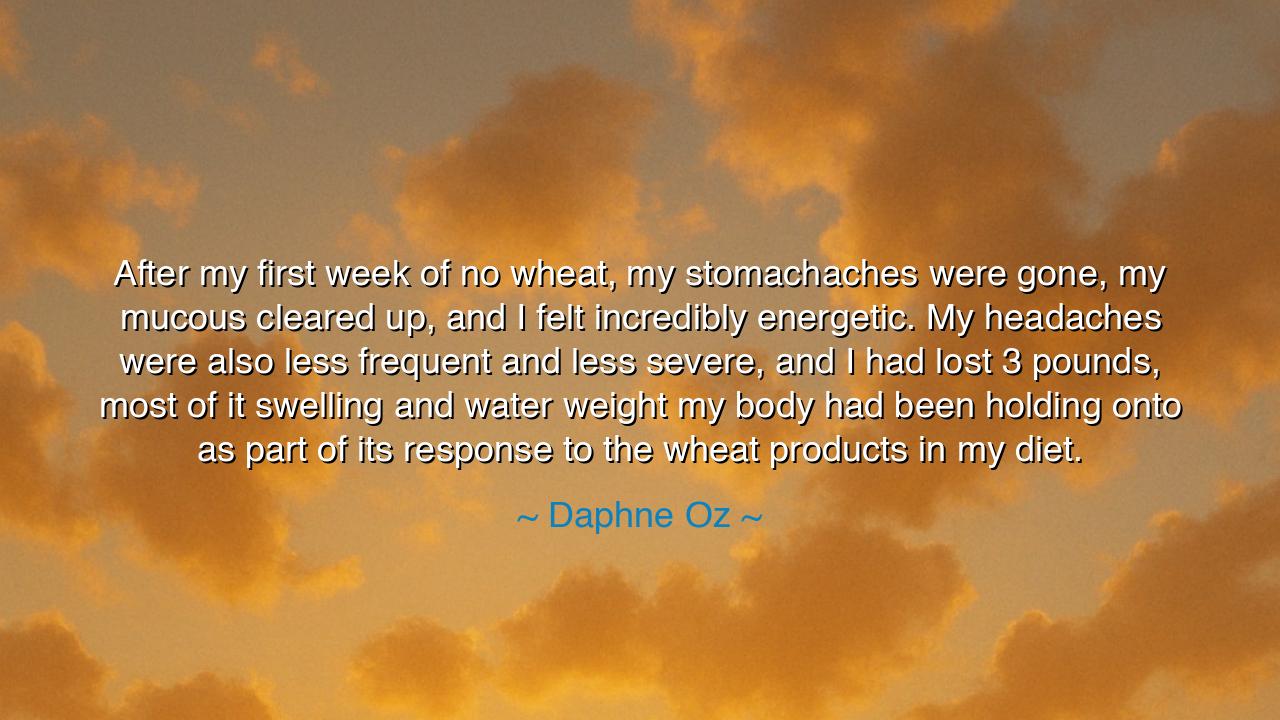
After my first week of no wheat, my stomachaches were gone, my
After my first week of no wheat, my stomachaches were gone, my mucous cleared up, and I felt incredibly energetic. My headaches were also less frequent and less severe, and I had lost 3 pounds, most of it swelling and water weight my body had been holding onto as part of its response to the wheat products in my diet.






"After my first week of no wheat, my stomachaches were gone, my mucous cleared up, and I felt incredibly energetic. My headaches were also less frequent and less severe, and I had lost 3 pounds, most of it swelling and water weight my body had been holding onto as part of its response to the wheat products in my diet." – Daphne Oz
In this revelation, Daphne Oz speaks not merely of a change in food, but of a transformation of awareness. Her words are not those of one chasing vanity, but of one awakening to the ancient dialogue between body and spirit. When she removed wheat from her table, she did not simply lose weight—she found clarity. The stomachaches, the mucous, the headaches, all were not random torments but messages—whispers from the body pleading for harmony. And when she finally listened, healing began. Such is the nature of truth: it waits patiently for us to hear it.
The ancients understood this sacred communication well. They believed that the body was a vessel of divine wisdom, that illness and discomfort were not curses, but signals. To the healers of Greece, Egypt, and the East, every symptom was a language. The body spoke through pain, through weariness, through imbalance—and the wise learned to interpret its words. Daphne Oz, in her journey of elimination and renewal, walked this same timeless path. By removing the grain that brought her harm, she became a listener to her own being. Her story reminds us that wellness is not imposed from without, but discovered from within.
Her awakening mirrors the tale of Hippocrates, who once treated a young scholar plagued by fatigue and constant swelling. The scholar sought exotic cures, yet Hippocrates, seeing the simplicity of the cause, instructed him to cease the daily bread that filled his table. Days passed, and the young man’s vitality returned. The master then said, “You sought healing in my herbs, but healing was already in your restraint.” So too does Daphne teach us that sometimes, the remedy is not in addition, but in subtraction—not in new indulgence, but in quiet removal of what does not serve the body’s peace.
When Daphne speaks of energy returning, it is not mere physical vigor she describes, but a lightness of being—the lifting of the fog that dulls the mind and burdens the heart. The clearing of the mucous and the fading of pain are more than bodily events; they symbolize the restoration of alignment between nature and self. In the ancient traditions of Ayurveda and Tao, this harmony was called balance of energies—the removal of stagnation that allows life to flow freely. Her experience is an echo of this truth: that when we purify the vessel, the spirit within it shines with new clarity.
Her testimony also reveals a truth about awareness—that modern life has dulled our sensitivity to what nourishes or harms us. We consume endlessly, heedlessly, blind to how foods affect our strength or stillness. But Daphne’s story teaches the ancient art of listening to the body’s wisdom. When something brings pain, fatigue, or heaviness, it is not punishment—it is information. The swelling and water weight her body held were not failures of discipline, but defenses of life itself, the body striving to protect her from imbalance. The moment she honored that wisdom, the body laid down its arms, and healing followed like the dawn.
There is heroism in this quiet awakening. It takes courage to part with what is familiar, to step away from what the world calls “normal” and follow one’s own truth. The ancients would call such a path the road of self-mastery—a journey of returning home to the natural rhythm of one’s own being. Daphne Oz walked this path with humility and discernment, and in doing so, she reminds all who hear her words that the journey to health begins not with rules, but with reverence.
The lesson, then, is one of gentle power: listen, observe, and honor what your body tells you. Do not dismiss its signs or silence its voice with haste or habit. If your food brings discomfort, change it; if your energy fades, seek its cause with patience. You do not need to obey every trend or label—follow instead the timeless guidance within. Remove what burdens you, and you will uncover what strengthens you. For healing is not something we chase—it is something we allow when we stop resisting the truth of what we feel.
Let these words be remembered as a teaching for generations: the body is not your enemy, but your oldest ally. As Daphne Oz discovered, when you listen to it and release what harms it—be it wheat, worry, or weariness—you do not merely grow healthier; you grow closer to your truest self. And in that alignment, you will find the purest form of energy—the energy of being wholly, harmoniously alive.






AAdministratorAdministrator
Welcome, honored guests. Please leave a comment, we will respond soon